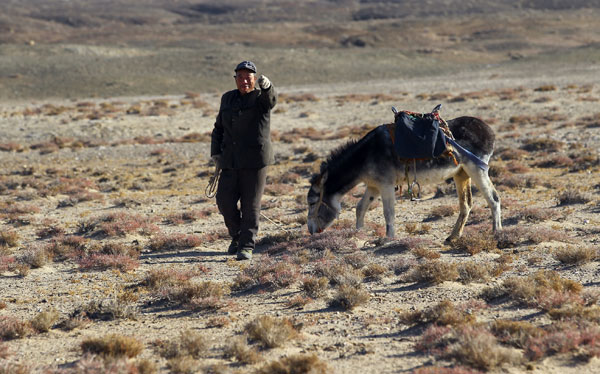An ancient land in change
By Cui Jia (China Daily) Updated: 2013-01-21 08:51"Although our Gobi may appear lifeless to outsiders, we know how to find water and mobile phone signals," said Bariba. Like most of the locals, who have adapted to a lifestyle based on grazing camels and mountain goats, the 61-year-old is a member of the Mongolian ethnic group.
While waiting to be picked up to check on his camels, Bariba enjoyed himself by standing at the ibex statue and watching several young people playing pool outside a grocery store. He greeted passersby with enthusiasm, calling out the names he knows by heart.
Buried treasure
"I wonder what sort of treasures are buried underneath the black Gobi?" mused Bariba, staring at the dusty off-road vehicles a geological exploration team had parked outside the restaurant next door. Scientists have discovered 128 mineral deposits in Mazongshan, including gold, coal and iron.
Hopping onto the pickup truck, Bariba began the search for his herd of 12 camels. The truck soon left the main road and entered the Gobi, being driven through scattered clumps of thick, stunted bushes. Bariba's family moved to Mazongshan from neighboring Inner Mongolia 50 years ago. "I really envy those herdsmen in Inner Mongolia who enjoy rich grasslands, but I'll never leave here," he said.
Without any navigation systems or tracking devices, the "camel boy" directed the driver to the area where his camels usually wander. With years of experience to guide him, Bariba has learned to identify unique stones and use them as landmarks, something an outsider would never be able to do.
The herdsmen don't graze their camels. Unlike the mountain goats owned by the herders, camels need to walk a long distance for food every day in the deserted Gobi. Instead, the herdsmen set up drinking spots for the camels. When they need to collect the camel fur, the herdsmen simply wait for the animals to turn up at the watering holes and catch them.
 |
|
A herdsman points the way in the Gobi desert. Photos by Zou Hong / China Daily |
- President Xi expects strong, modern rocket force
- Four former senior officials charged with bribery in action against corruption
- Survey indicates a greater need for sexual education
- Tiangong-2 space lab enters preset orbit for docking with manned spacecraft
- Air force in Pacific drill to test far-offshore strength
- Shanghai easing way for expat talent
- World's largest telescope begins peering into space
- First rapid response police unit 'fit',
UN says - Space lab begins tests in orbit, prepares for visit by astronauts
- Police, banks cooperate to fight telecom fraud











